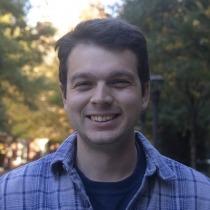
Robert Casey Wilson
What is your next adventure?
I have accepted a job as a propulsion analyst at SpaceX in Los Angeles. I'll be doing structural analysis for SpaceX liquid rocket engines.
What about your next adventure are you most looking forward to?
I'm excited to be moving to the west coast, because I grew up on the east coast. I'm also excited about the job, which is more or less a continuation of what I was doing as an intern. I'm looking forward to seeing the Starship fly sometime in the next few years because I'll be doing work to support it.
Did you have any previous co-op, internship, or research experience in this area?
Research-wise, I've worked on airbreathing propulsion systems with [Dr.] Jimmy Tai. Before I got to Tech as a graduate student, I did two internships at JPL, where I worked on optics for telescopes that are designed to find exoplanets. The optics are tricky because these exoplanets are about 10 billion times fainter than the stars nearby. Towards the end of my undergrad, I was pretty sure I was going to come to Tech, but I interviewed with SpaceX while I was at JPL, and I got an offer. That's when something didn't feel right. So I flipped a coin, and it came up for SpaceX. That was the company I'd always wanted to work for and I realized that, if I gave it up to go to graduate school, I may never get that offer again. Still wasn't sure. So I made a spreadsheet with 15 different metrics to see where I should go. Even then, the results were all within a margin of error. If was 50/50 either way. I had no idea if I made the right decision. And maybe I still don't, but my gut tells me that grad school at Tech was the right decision. I did an internship at SpaceX last summer, and that really helped me to get a job there.
How did your educational experience at Georgia Tech help you to achieve your goals?
For one thing, being involved in the ASDL [Aerospace Systems Design Lab] gave me an opportunity to learn systems engineering. It also helped me take things I learned as an undergraduate and apply them to real-world problems. That's exactly what the Grand Challenges do - give you a problem to solve for a company. I was involved in two. In the first, I helped design an ICBM - the successor to the Minuteman - for a AIAA Missile Systems competition. In the second one, I worked with NASA's Advance Concept Office in Huntsville developing a framework for repurposing codes.
I also got a great deal of stress relief from working on Sustain Alive [Tech's submission to the Spaceport America Cup competition]. Whenever I was burned out with the lab, I would go over and work on the rocket. I did as much learning as I did teaching, but, in the end, it was an outlet because I got to work with a great team -- mostly freshmen -- who were willing to use all of their free time to the rocket. The dynamic was great, and winning the competition as a first-year team wasn't bad either.
What advice would you give to an underclassman who would like to follow the same path?
For one thing: don't take things too seriously. Find a place to go when you are stressed and go there. For me it was the rocket team. Also, find people who have common interests and you'll find people who will help you de-stress. That happens a lot with the student club teams, like the rocket team I worked with. YOu can't overestimate the impact. NO matter how busy you are at crunch time, you'll see people putting in time on the club project. With the [Sustain Alive], people put in as much time working on that rocket as they did studying. And it helped. That's one of things that convinced me that I'd made the right choice when I came to Tech - these are the people I want to look back and remember. That team mentored me.